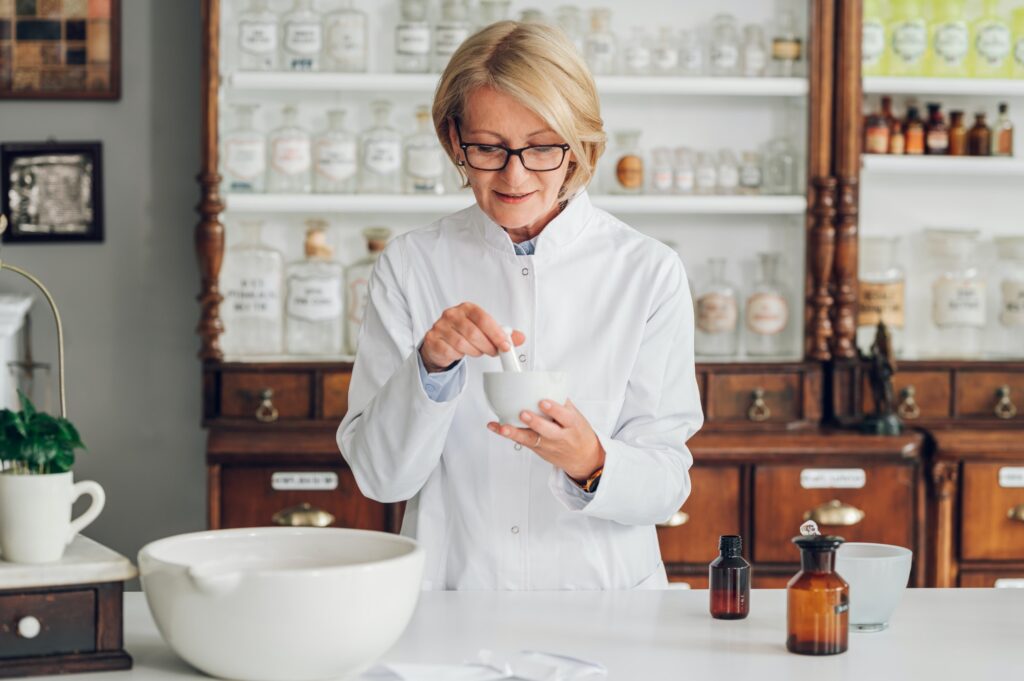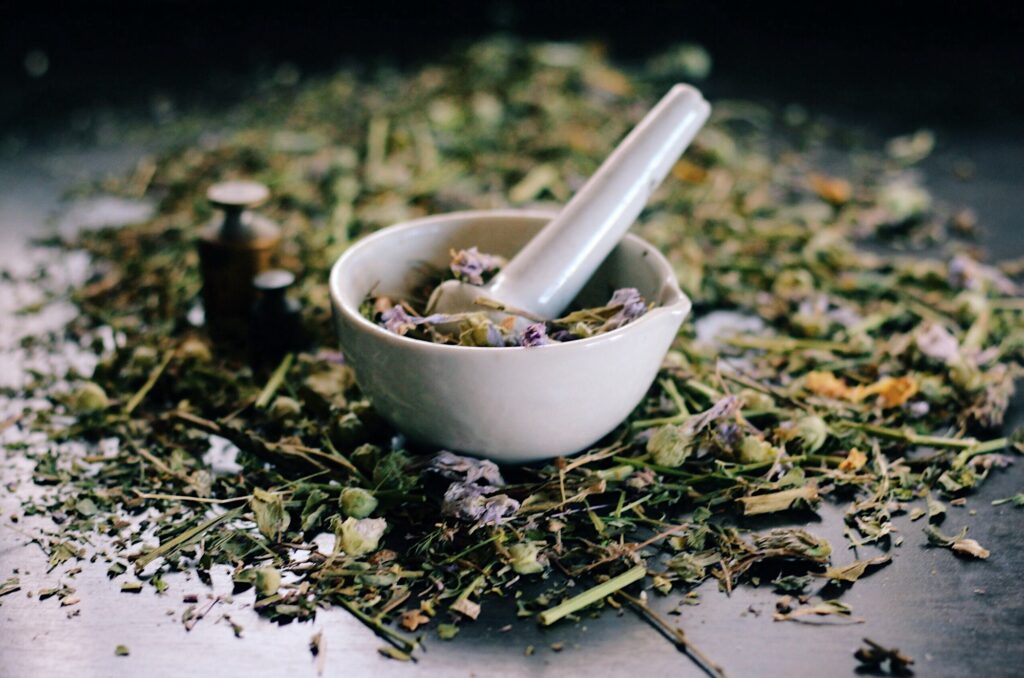
5 Menopause Support Complex Supplement to Help Ease Symptoms
Menopause support complexes are dietary supplements with herbal extracts and vitamins aimed at alleviating symptoms during menopause
Well folks, it’s that time of life for many women. After decades of happy hormone production, the menopause transition can be a difficult experience. From night flashes to irritability, to downright exhaustion, menopausal symptoms can take a toll. Looking for a safe way to manage menopause symptoms? You’re in luck! Here, we’re examining 10 natural remedies for menopause — offering everything from lifestyle strategies to herbal remedies. So settle in, because you’ve got plenty of options that can help your transition become easier and more manageable. Let’s get started!
Herbal remedies are a popular and natural way to ease some of the uncomfortable symptoms associated with menopause. Over the years, many women have found relief from hot flashes and night sweats using herbs such as black cohosh, dong quai, licorice root and evening primrose oil. However, it is important to note that not all herbal remedies have been proven safe, effective or without adverse reactions.
For example, black cohosh has been studied for its potential benefits in controlling mood swings and reducing hot flashes and night sweats. While many studies show positive effects in individuals, others suggest there is no significant difference between the herb and a placebo. In addition, there is some evidence pointing to potential liver-related side effects when taking this herb in high doses.
Dong quai is a herb popular in traditional Chinese medicine for easing menopausal symptoms, particularly hot flashes and night sweats. It also may improve mood disturbances commonly seen during menopause. The degree of effectiveness is still largely debated, however; clinical trials do not unanimously support dong quai’s efficacy over that of a placebo. Also to be aware of are potential interactions with anticoagulant and antiplatelet drugs.
Licorice root is often used along with other compounds to create herbal teas or tinctures said to promote hormonal balance while alleviating common menopausal issues such as vaginal dryness and fatigue. Some limited evidence exists supporting its use to reduce hot flashes but more research is needed to confirm its safety and effectiveness. Again, there can also be a risk of drug interactions with certain medication types when taking licorice root products on their own or mixed together with other ingredients.
Finally, evening primrose oil contains gamma linoleic acid which has been touted as a possible treatment for menopausal discomfort due to hormone changes experienced during this life stage. Although widely used by women ever since the 1970s when it was introduced into American markets, the limited scientific evidence available does not support evening primrose oil’s claims of being a reliable symptom fighter for individuals going through menopause or perimenopause stages.
As herbal remedies for menopause remain widely popular yet inconsistently tested in scientific studies, it is important for individuals considering their use to be informed about both potential benefits and possible dangers they might present before jumping into consumption of these compounds or treatments. Menopausal women should always talk with their healthcare provider before adding any herbal supplements to their daily routine in order to discuss the right product types along with proper dosage amounts to avoid negative consequences.
Now that we have discussed different herbal remedies for menopause along with their various pros and cons, let us look at how exercise, diet, and lifestyle modifications can contribute towards successfully navigating this major life transition period ahead.

Herbal remedies for menopause, such as black cohosh, dong quai, licorice root and evening primrose oil, are widely popular and natural ways to ease some of the uncomfortable symptoms associated with menopause. However, while these herbs may offer potential benefits, they also come with risks such as drug interactions and even adverse reactions when taken in high doses. Therefore, it is important for individuals considering their use to be informed about both potential benefits and possible dangers before starting consumption. Menopausal women should always talk to their healthcare provider beforehand to discuss the right product types and proper dosage amounts. In addition to herbal remedies, exercise, diet and lifestyle changes can help navigate this major life transition period successfully.
There is a strong argument that diet and lifestyle modifications can play a role in the alleviation of menopausal symptoms. Modifications to exercise habits and food choices can have a positive effect on the body’s physical, mental, and emotional well-being. Exercise releases endorphins that increase feelings of happiness and may reduce hot flashes. Additionally, physical activity helps to combat fatigue associated with menopause as well as build muscle mass and strengthen bones. For dietary modifications, eating patterns can be adjusted so that they are low in fat and sugar while high in lean proteins and fresh vegetables. These foods help maintain stable blood sugar levels which are associated with improved energy levels throughout the day. In the same vein, avoiding caffeine consumption while encouraging the intake of healthy fats such as those found in flaxseed or chia seeds may reduce hot flashes.
At the same time, some experts believe that diet changes are not as effective for addressing menopausal symptomatology as one might think. They posit that women should focus less on a specific dietary pattern like Paleo or Mediterranean but instead learn how to make healthier choices from within their existing lifestyle and diet preferences.[1] Further research is needed to substantiate these claims on both sides of the debate.
Making mindful changes to an individual’s daily lifestyle also has potential benefits. Habits like becoming more organized or getting enough sleep can substantially improve an overall sense of well-being during this time sensitive transition of life.
Thus, exercising, making beneficial dietary adaptations, and formulating mindful lifestyle habits are all important factors for naturally managing menopause symptoms. By focusing on regular physical activity combined with healthy food choices, individuals may find relief from the discomfort typically associated with menopause. The next section will discuss the importance of reducing stress when it comes to effectively managing menopausal symptomatology.
[1] https://www.healthline.com/health/menopause/diet-and-menopause

Vagal maneuvers are a natural remedy that have been proposed to help relieve menopause symptoms, such as hot flashes. The vagus nerve is a large cranial nerve that runs from the base of the skull down to the abdomen and is responsible for sending signals between the brain and the gut. Vagal maneuvers involve involuntary physical activities, such as holding the breath, straining the abdominal muscles, or pressing on certain parts of your neck or abdomen. These activities stimulate the vagus nerve and cause muscular contractions in your body, which helps to reduce hot flash frequency and intensity.
Proponents of using vagal maneuvers to treat menopause symptoms argue that these techniques are safe, non-invasive, and can be done at home without any additional costs. Additionally, they are not known to have side-effects like medications can have. However, detractors caution that while vagal maneuvers can be helpful, they should not be used as a replacement for medical care because it is still unclear how effective they are. They also advise against those with certain conditions (e.g., heart disease) to consult their doctor before attempting any of these maneuvers.
By understanding and applying appropriate vagal maneuvers, women in menopause may find reduction in their hot flashes. However, it is important to speak with a healthcare provider first before attempting these at home remedies as safety must remain paramount.
Homeopathy can be used as an alternative natural remedy for menopause symptom relief. Homeopathic remedies are typically composed of highly diluted amounts of certain minerals and herbs. These remedies can be used to encourage the body’s own healing response by providing a very small amount of a substance that causes symptoms similar to what the patient is feeling. Since homeopathic remedies work on emotional, physical, and mental levels, they can help balance hormones associated with menopausal symptoms.
Proponents for homeopathy believe it is beneficial for treating menopause because of its ability to stimulate the body’s immune-response. They say that it can help reduce hot flashes, night sweats, vaginal dryness and other common side effects brought on by sudden changes in hormone levels. Additionally, they say that this form of therapy allows women to maintain their hormonal balance while avoiding harmful chemicals or medications with potentially damaging side effects.
On the other hand, critics of homeopathy argue that there is no scientific evidence to prove that homeopathic treatments actually work to alleviate menopausal symptoms. They claim that since the vast majority of ingredients in these therapies are so highly diluted that they contain almost no active ingredients at all and therefore provide no real benefit.
Regardless of which side you come down on, it’s important to discuss any potential homeopathic treatments with your doctor before trying them out. Ultimately, only your doctor can recommend the best treatment plan based on your individual needs and health condition.
With that said, let’s move on to the next section about natural supplements for menopause relief. We’ll explore the different types of natural supplements available and how they may be able to alleviate symptoms like hot flashes, irritability and depression brought on by fluctuating hormones during menopause.

Natural supplements may be a beneficial aid in relieving the symptoms of menopause. Taking natural supplements such as essential oils, fish oil, red clover, vitamin E, and phytoestrogens can help to relieve the most common menopausal symptoms.
Essential Oils: Essential oils such as lavender, geranium and clary sage can help reduce menopausal symptoms like hot flashes and night sweats. Research has also shown that using these oils through aromatherapy in a diffuser or by applying them directly to the skin can be effective.
Fish Oil: Fish oil is rich in omega-3 fatty acids, which have been linked to reducing inflammation and balancing hormones. It’s also known to reduce stress levels, which can improve sleep quality, mood and energy levels during menopause.
Red Clover: Red clover contains isoflavones, which are plant compounds with estrogen-like properties. They can help with hot flashes and night sweats due to their hormone-balancing effects. Red clover is available in capsules, teas and tinctures at most health food stores.
Vitamin E: Vitamin E is an antioxidant that can reduce inflammation. Taking doses of 400 IU of vitamin E daily for three months during menopause can reduce hot flashes and night sweats. Additionally, it helps balance hormone levels and reduce fatigue associated with menopause.
Phytoestrogens: Phytoestrogens are plant compounds that interact with estrogen receptors in the body. Foods rich in phytoestrogens include soybeans, tempeh, flaxseeds and sesame seeds. Herbs like wild yam, ginseng and red raspberry leaf may also provide relief from some of the symptoms of menopause.
While natural supplements have the potential to provide relief from many of the common symptoms associated with menopause, it is important to talk to your doctor first before taking any supplement. Additionally, certain supplements can interact with medications you may already be taking or cause side effects if taken inappropriately so always make sure you speak with your health care provider before starting any supplement regimen for menopause relief.
With this knowledge in hand about natural supplements for menopause relief, we will now move on to dealing with hot flashes and night sweats—two of the most prominent symptoms associated with this phase of life for women.
Hot flashes and night sweats are two of the most common symptoms associated with menopause. While it varies from woman to woman, as many as 75 percent of women going through menopause report experiencing hot flashes and/or night sweats. As uncomfortable and disruptive as these symptoms can be, there are a few natural remedies that can help.
One remedy is soy products or supplements containing isoflavones. Soy is a plant-based source of isoflavones, compounds thought to act like estrogen in the body. It may help lessen hot flashes and night sweats when consumed in adequate amounts on a regular basis. However, there are debates about the potential risks of consuming large amounts of soy over an extended period of time, so use caution when considering this option.
Herbal teas are another natural solution for relieving hot flash and night sweat symptoms. Herbs such as sage, chaste berry, black cohosh, red clover, and dong quai have all been studied for their effects on menopausal symptoms and have been found to help reduce some hot flash intensity or frequency. Making daily herbal tea to drink throughout the day or just before bedtime could help provide relief from hot flashes or night sweats when combined with other treatments and lifestyle changes.
Some studies have suggested that certain dietary changes may decrease both hot flash severity and frequency. Incorporating plenty of whole grains into your diet – such as oatmeal, brown rice or quinoa – may also help reduce symptoms due to their ability to prevent blood sugar swings that can trigger hormone fluctuations. Eating lean protein sources on a regular basis can also minimize hot flashes due to their ability to stabilize levels of hormones. Limiting processed foods can be beneficial too since their high sodium content could disrupt hormone signals in your body.
There are several methods for dealing with the uncomfortable and sometimes disruptive symptoms associated with menopause like hot flashes and night sweats. Combining natural approaches with changes in lifestyle habits can create a powerful combination for minimizing these common menopause complaints.

Coping with menopause anxiety and mood changes can be a difficult task. While the fluctuating hormones that accompany menopause can lead to issues such as insomnia, hot flashes, night sweats and changes in libido, these physical symptoms are often accompanied by psychological effects as well. Managing these psychological effects is important in order to improve overall quality of life.
For some women, menopause brings on feelings of anxiety and depression. Women report feeling overwhelmed, irritable, worried and having frequent crying spells due to hormonal fluctuations brought on by menopause. Research suggests that exercise may help to lift moods and reduce stress levels during this time. Exercising regularly can improve sleep and concentration while helping to minimize depressive symptoms associated with this transitional stage of life. Additionally, activities such as yoga, tai chi or mindfulness meditation can reduce feelings of stress and bring peace of mind to those going through menopause.
Social support is an important factor for managing menopausal mood changes and anxiety. Joining a support group or talking to a therapist can help to provide validation and coping strategies from others going through similar emotions. Other positive techniques for dealing with anxiety include controlling breathing patterns, relaxation exercises or taking part in activities that make one feel happy.
Lastly, many women rely on hormone therapy in order to address menopausal symptoms including anxiety and depression. Hormone therapy has been used extensively since the 1970s; however there are still questions about its safety and long-term effectiveness when it comes to managing anxiety/mood swings associated with menopause. Some experts believe that hormone therapy is safe and effective while others argue that more research is needed before making any recommendations. Ultimately, it is important to consult a physician before engaging in any kind of hormone therapy.
Herbs can be incredibly helpful for providing natural relief from menopause symptoms. Some of the most popular herbs for menopause are Red Clover, Black Cohosh, Chasteberry, Valerian Root, Dong Quai and Wild Yam.
Red clover helps to naturally balance hormones and reduce symptoms such as hot flashes and night sweats. Black cohosh helps to reduce vasomotor instability associated with the “power surge” that can often occur during menopause. Chasteberry helps to regulate hormones (progesterone in particular) and ease menstrual related issues. Valerian Root has a calming effect on the body and helps to reduce anxiety or insomnia. Dong Quai is a Chinese herb used for centuries as a gentle tonic for women’s health issues. Wild Yam root contains chemicals called saponins which help to maintain hormonal balance by converting into progesterone in the body.
It is important to talk with your doctor before taking any herbal remedies as some may interact with other medications you may be taking or have contraindications with pre-existing conditions.
Yes, there are numerous natural remedies for hot flashes that have been proven to help relieve symptoms. Some remedies include:
• Herbal teas such as chamomile, lavender, or peppermint which may be taken either warm or cold as needed to soothe the effects of hot flashes and night sweats
• Foods high in phytoestrogens, such as flax seeds, nuts, beans, and soy products
• B Vitamins to regulate hormones
• Exercise – This can help your body regulate its temperature better by increasing circulation and improving air flow.
• Aromatherapy – Certain essential oils can be used aromatically to help reduce stress and reduce hot flashes.
• Relaxation techniques – Breathing exercises and relaxation techniques can also help to alleviate hot flash symptoms.
• Dietary changes – Eating a balanced diet with plenty of fruits and vegetables and limiting caffeine and alcohol consumption can also help to reduce hot flashes.
Overall, there are several natural remedies available to relieve hot flash symptoms. However, it is best to consult with a qualified health care provider before starting any treatment program.
Diet and lifestyle changes are one of the best ways to alleviate symptoms of menopause.
It’s important to maintain a healthy and balanced diet rich in fiber, vitamins, minerals, and antioxidants that can help keep your hormones balanced. Eating fresh fruits and vegetables as well as lean proteins can support the body during this transitional period. Additionally, proper hydration is essential for managing menopause symptoms.
In terms of lifestyle changes, it’s important to get plenty of exercise and quality sleep on a regular basis. Exercise helps reduce stress levels and improve overall energy levels. Getting enough sleep is also key for providing the body with necessary rest and energy reserves to help manage any discomfort associated with menopause. Reducing stress through daily activities such as yoga, meditation, or just having fun can also be beneficial.

Menopause support complexes are dietary supplements with herbal extracts and vitamins aimed at alleviating symptoms during menopause

Vitamin C, D3, Zinc, and Quercetin support immune health. They enhance immune cell function, fight infections, reduce inflammation, and provide antioxidant benefits.

Ginseng, a valued herb with adaptogenic and antioxidant properties, is popular as a supplement for improved well-being, energy, and immune function.

Nootropic supplements enhance focus, memory, and cognitive function. They boost mental clarity, motivation, and creativity for improved performance and brain health.

Garcinia cambogia, a tropical fruit, is touted for weight loss. Its active ingredient, HCA, may inhibit fat formation, but evidence is limited. Consult a professional before use.

More and more people are jumping on the mushroom supplement bandwagon these days, but you should be aware that there are potential side effects you should know about before taking the plunge. Whether you’re begging for overall well being or looking for an extra performance boost, you’re going to want to make sure you’re making an informed decision before adding mushroom supplements to your daily routine. We’ve put together a list of potential side effects to look out for, so read on and learn the truth before you start popping those pills.

Moringa, the “miracle tree,” offers numerous benefits. Moringa supplements provide essential nutrients, antioxidants, anti-inflammatory effects, and potential blood sugar and cholesterol regulation. They support immunity and combat malnutrition, but medical advice is essential.

It’s a good thing that Mother Nature both created and found cures for many of the ailments we humans suffer from. From the common cold to serious diseases, herbs have the potential to not only alleviate symptoms, but to completely prevent illnesses in the first place! Herbal remedies for immune system support have become increasingly popular as natural ways to boost your immunity against illness start to catch on.
